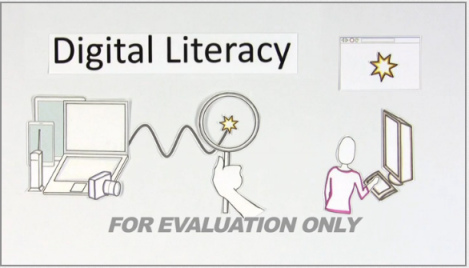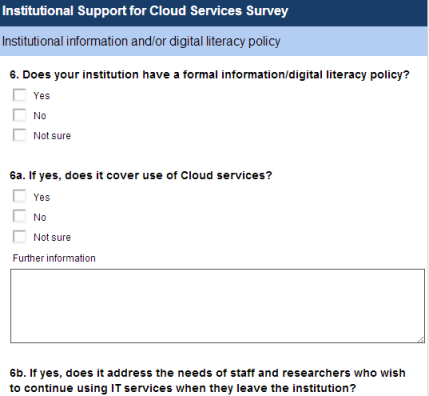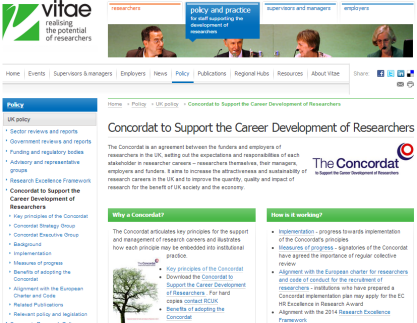Preparing our Users for Digital Life Beyond the Institution
Posted by Brian Kelly on 3 Mar 2014
About This Post
This blog post provides background information on digital literacy and argues that digital literacy needs to go beyond student teaching and ensure that staff and researchers, who may wish to continue their professional activities when they leave their current institution, are able to migrate content and services to the Cloud, so that content and tools can be reused once access to institutional services is no longer available.
The post concludes with an invitation for those with responsibilities for or interest in digital literacy to complete a survey which aims to gather information about current work in providing digital literacy support for staff and researchers, especially in preparing for digital life outside the host institution. The results of the survey will be presented at the LILAC 2014 information literacy conference.
Common Craft and LILAC on Digital and Information Literacy
 I recently came across an animated cartoon on Digital Literacy published by Commoncraft. The cartoon explains that:
I recently came across an animated cartoon on Digital Literacy published by Commoncraft. The cartoon explains that:
… there is a new kind of literacy that touches almost everyone in our modern world. It’s not related to a specific industry or job title. This literacy matters to both young and old and has become more important as computers and electronic devices have become more of a necessity in daily life.
I’m talking about digital literacy – the ability to use technology to navigate, evaluate and create information.
LILAC, the Librarians’ Information Literacy Annual Conference, defines information literacy as ‘the ability to find, use, evaluate and communicate information’. I find this latter definition more useful, as it includes the importance of using and not just evaluating information. However I prefer the term ‘digital literacy‘ as this goes beyond information and can include digital services and not just digital content.
The LILAC Web site goes on to describe how information literacy is “an essential skill in this digital age and era of life-long learning“. This emphasis on the importance of use of information to support life-long learning highlights the need to be able to use and manage digital information – and the digital services which manages the digital information – throughout one’s life, and not just when one if studying or working within an education institute.
SCONUL, the main representative body for academic libraries in the UK and the Republic of Ireland, uses the term ‘Digital Literacies‘ in a page on the Jisc Web site. This describes how the SCONUL Working Group on Information Literacy has developed the 7 Pillars of Information Literacy through a Digital Literacy ‘lens’ (MS Word format) which includes the ability to “Use a range of digital retrieval tools and technology effectively“, “Use appropriate tools to organise digital content and data” and “Manage digital resources effectively taking account of version control, file storage and record keeping issues“. This emphasis on the need to be able to use tools to organise and manage digital resources is important. I therefore find a definition of digital literacy as “‘the ability to find, use, reuse, evaluate, manage and communicate digital information” helpful. I’ve expanded ‘use‘ to ‘use and reuse‘ to highlight the importance of addressing the life cycle of digital content, in which content may migrate to new services.
Digital Literacy for Members of Staff and Researchers
Many staff and researchers in higher educational institutions will make use of digital content and services and would regard themselves as digitally literate. Within the context of the services they use within their host institution this may be true. But what happens when they leave their host institution (which we all will at some stage) and wish to continue using content and services and their online communities? This may be particularly relevant for researchers on short term research contracts.
The ability for highly skilled academics and researchers to be able to continue to be productive members of society is important when one considers that “Universities in the UK contributed £3.3 billion to the economy in 2010-11 through services to business, including commercialisation of new knowledge, delivery of professional training, consultancy and services” – might the commercial value to the economy provided by the sector be undermined if members of staff leave their host institution and are hindered from continuing to make use of their digital content due to a lack of expertise?
Ensuring that staff and researchers were able to continue to make use of their digital content and manage their online communities was probably not of great importance in the past, when one’s content could often be transported on floppy disks or memory sticks and the digital services which were used were could only be accessed within the institution’s network. However there is now a need to be able to respond to the radically changed environment in which Cloud services can be accessed by anyone, anywhere, there is a much greater volatility in the job market and the increasing important of open content, open data and open source software is minimising licence barriers to reuse of digital content and tools.
What Should Be Done and Who Should Do It?
Last year, in the run-up to my redundancy following the announcement of the Jisc cessation of core funding for UKOLN, I gave a talk on When Staff and Researchers Leave Their Host Institution at the LILAC 2013 Conference. The talk was based on personal experiences and described my views on the importance of researchers profiling services, such as Academia.edu and Researchgate, not only for providing a record of my research outputs but also osting the content so that I could continue to manage the papers and the metadata once I lost the ability to manage information for my content hosted on Opus, the University of Bath repository.
Who is Responsible?
But what is happening across the sector in terms of ensuring that members of staff and researchers are being provided with the skills and expertise needed to continue to be effective professionals when they leave their host institution?
Should it be the responsibility of the Library, who have responsibilities for information literacy? In light of the importance of digital tools and services, perhaps it should be the responsibility of IT Service departments? Or maybe research support units or careers advisory services? In cases in which staff are being made redundant, perhaps the UCU or other unions could have a role to play in ensuing that union members are provided with appropriate training.
National Strategies?
If it is felt that there is a need for approaches provided at a national level perhaps SCONUL should look to ensure that their 7 Pillars of Information Literacy through a Digital Literacy ‘lens’ goes beyond undergraduate teaching.
For researchers, it might be appropriate ensure that Vitae’s Concordat to Support the Career Development of Researchers and, in particular, the Concordat’s support and career development:
Principle 3: Researchers are equipped and supported to be adaptable and flexible in an increasingly diverse, mobile, global research environment
is implemented across the sector to address researchers ability to manage their digital content in a Cloud environment.
What is Being Done?
 Jenny Evans, the Maths and Physics Librarian at Imperial College London, and myself have had a proposal accepted for the LILAC 2014 conference entitled “Are Institutions Preparing Staff for Digital Life Beyond the Institution?” This will be based on a survey of institutional practices in providing support for staff and researchers so that they will have the skills needed to make use of digital content and services when they leave their current institution. We have created an online survey in which we invite staff across the sector who may have responsibilities for developing policies in this area and delivering the appropriate training and support to summarise their current practices or their plans. Since we appreciate that there may be a number of groups with interests in this area, including:
Jenny Evans, the Maths and Physics Librarian at Imperial College London, and myself have had a proposal accepted for the LILAC 2014 conference entitled “Are Institutions Preparing Staff for Digital Life Beyond the Institution?” This will be based on a survey of institutional practices in providing support for staff and researchers so that they will have the skills needed to make use of digital content and services when they leave their current institution. We have created an online survey in which we invite staff across the sector who may have responsibilities for developing policies in this area and delivering the appropriate training and support to summarise their current practices or their plans. Since we appreciate that there may be a number of groups with interests in this area, including:
- Library departments within institutions.
- Library organisations such as SCONUL and CILIP.
- IT departments within institutions.
- IT organisations such as UCISA.
- Staff development departments within institutions.
- Academic departments.
- National bodies such as Jisc, Vitae, etc.
- Research funding organisations.
- Unions.
- The BCS (British Computer Society) and its Digital Literacy for Life programme.
We invite feedback from anyone with strong interests and involvement in this area; it would be better to get duplicate information than to have gaps in the information we gather. We would also invite those working outside to UK to provide information in related activities happening outside the UK. We will, of course, provide a public summary of our findings. In addition to the invitation to complete the survey, comments on this topics are also welcome on this blog post. The comments may address the topic area, but suggestions on ways of sending an invitation to complete the survey to relevant groups would also be welcome.
View Twitter conversations and metrics using: [Topsy] – [bit.ly]





Preparing our Users for Digital Life Beyond the... said
[…] About This Post This blog post provides background information on digital literacy and argues that digital literacy needs to go beyond student teaching and ensure that staff and researchers, who ma… […]
Preparing our Users for Digital Life Beyond the... said
[…] About This Post This blog post provides background information on digital literacy and argues that digital literacy needs to go beyond student teaching and ensure that staff and researchers, who may wish to continue their professional activities… […]
LILAC 2014: Preparing Our Users for Digital Life Beyond the Institution « UK Web Focus said
[…] to Michael Stephens who publicised the survey on his Tame the Web blog. The survey was also announced on this blog and was also mentioned in the CILIP Update magazine. The survey was closed on 17 March, having been […]
Preparing our Users for Digital Life Beyond the... said
[…] This blog post provides background information on digital literacy and argues that digital literacy needs to go beyond student teaching and ensure that staff and researchers, who may wish to continue their professional activities when they leave their current institution, are able to migrate content and services to the Cloud, so that content and tools can be reused once access to institutional services is no longer available. […]